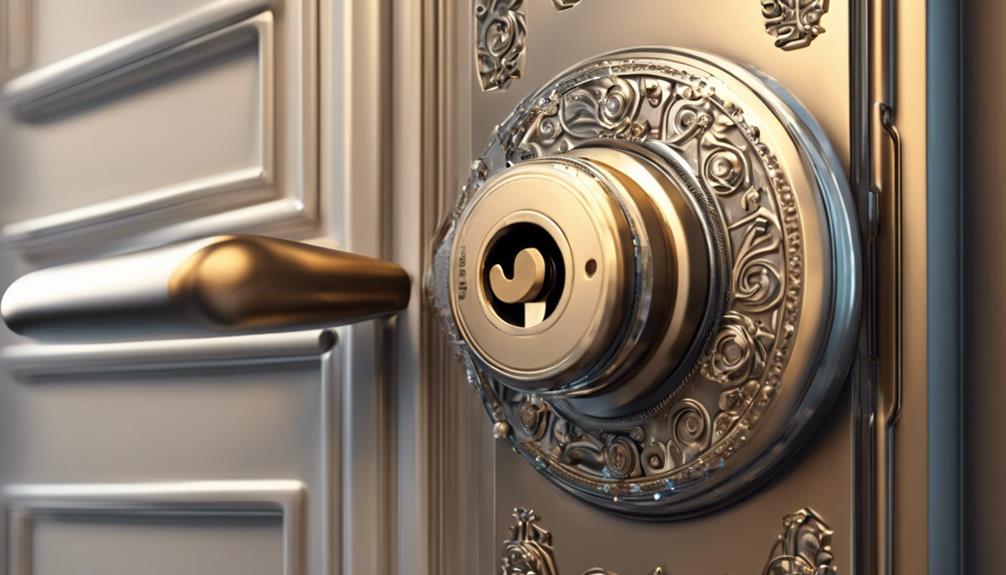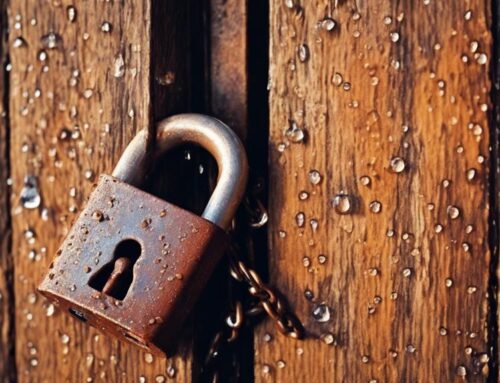High-security locks are essential for protecting your property. They use advanced technology and materials to deter break-ins and unauthorized access. You'll find features like complex keyways to prevent duplication and pick-resistant mechanisms that enhance security. When choosing a lock, consider your specific needs, installation options, and maintenance requirements. These locks come with varying prices, but their durability and effectiveness often lead to long-term savings, including potential insurance discounts. Remember, the right choice can make a significant difference in keeping your home or business safe. There's plenty more to uncover about selecting the best high-security lock for your needs.
Key Takeaways
- High-security locks provide enhanced protection against unauthorized access, utilizing advanced technology and robust materials to deter intruders.
- They feature complex keyways and advanced key control systems to restrict unauthorized key duplication, ideal for commercial environments.
- Various types include deadbolt locks, smart locks, and biometric locks, each offering unique benefits for different security needs.
- Professional installation is recommended to ensure proper functionality and maintain warranty validity, avoiding vulnerabilities from DIY attempts.
- High-security locks may lead to long-term savings through durability, reduced theft risk, and potential lower insurance premiums.
Definition of High-Security Locks
High-security locks are designed to provide enhanced protection against unauthorized access and break-ins. They go beyond standard secure locks by incorporating advanced technology and robust materials that deter potential intruders.
Understanding high-security lock pins is essential as these specialized components are engineered to resist common attack methods. When you choose high-security locks, you're investing in peace of mind for yourself and those you care about.
These locks often feature complex keyways that make unauthorized duplication nearly impossible. This means that, unlike traditional locks, you won't have to worry about someone easily making a copy of your key.
Additionally, many high-security lock features include hardened steel construction, anti-drill plates, and pick-resistant mechanisms, ensuring that your property remains secure.
Key Features of High-Security Locks
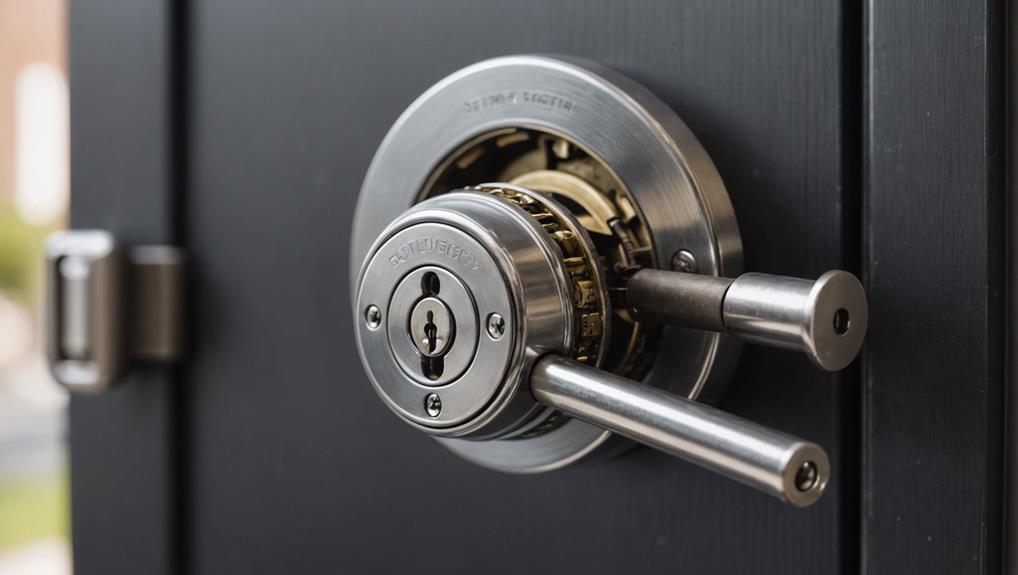
When you choose high-security locks, you're looking at features that greatly enhance your security.
Investing in high-quality locks can provide long-term savings by reducing the risk of theft and damage, as discussed in investing in quality locks.
Advanced key control guarantees that only authorized individuals can obtain duplicates, while pick resistance technology makes it much harder for intruders to bypass your lock.
Together, these features provide a robust defense against unauthorized access.
Advanced Key Control
Advanced key control is essential for maintaining security in both residential and commercial settings. When you choose the best high-security locks, you're not just investing in a product; you're enhancing the safety of your environment.
High-security lock brands offer sophisticated key control systems that restrict unauthorized duplication and provide precise tracking of who's access to your property. With these locks, you can manage who receives keys and when they can use them.
This level of control is particularly valuable in commercial settings where employee turnover can lead to security vulnerabilities. By following a high-security lock buying guide, you can select locks that not only meet your security needs but also offer advanced key management features.
For instance, some high-security locks come with patented key designs, ensuring only authorized locksmiths can make copies. Additionally, you might find systems that allow for easy rekeying, so you can quickly adjust access as needed.
Ultimately, investing in advanced key control will give you peace of mind, knowing that you've taken significant steps to protect your space and serve those who rely on your commitment to safety.
Pick Resistance Technology
Utilizing pick resistance technology is a key feature that sets high-security locks apart from standard options. When you consider high-security lock installation, it's crucial to understand how these locks thwart unauthorized entry.
Anti-pick locks are designed specifically to resist manipulation, making them a formidable barrier against intruders.
Here are some important aspects of pick resistance technology you should know:
- Complex Pin Systems: These locks often use multiple pins and unique configurations to complicate picking.
- Specialized Key Designs: Many high-security locks come with specialized keys that are harder to duplicate and pick.
- Materials and Construction: Durable materials enhance the lock's resistance to physical attacks, not just picking.
- Restricted Keyways: These prevent unauthorized key duplication, ensuring only trusted individuals have access.
- Testing and Certification: Look for locks that meet rigorous testing standards for pick resistance.
Understanding these features empowers you to choose the right lock for your needs.
Anti-Pick Technology Explained
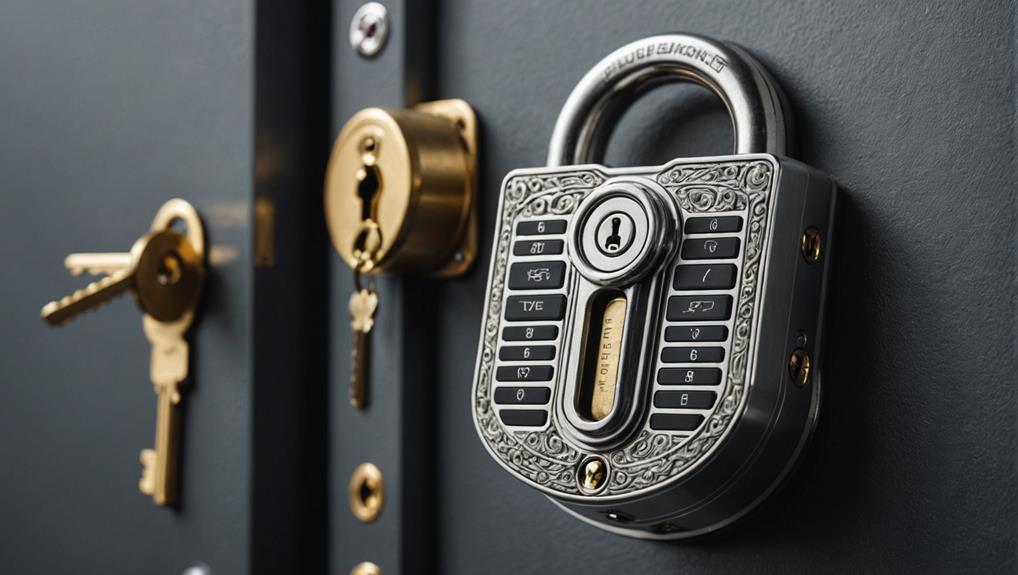
Many people underestimate the importance of anti-pick technology in high-security locks, but it plays a significant role in preventing unauthorized access. This technology is designed to thwart lock picking, a common method used by intruders to bypass traditional locks.
Anti-pick mechanisms often include specially designed pins or tumblers that make it extremely difficult for lock pick tools to manipulate them effectively. Understanding how tumblers affect lock security is essential for homeowners looking to enhance their protection.
When you choose a lock with anti-pick technology, you're ensuring that your security measures are robust. These locks typically feature complex mechanisms that require specific tools and skills to pick, making them a deterrent for even the most experienced burglars.
As a result, you're not just protecting your possessions; you're also safeguarding the well-being of those who depend on you.
Reinforced Materials and Durability
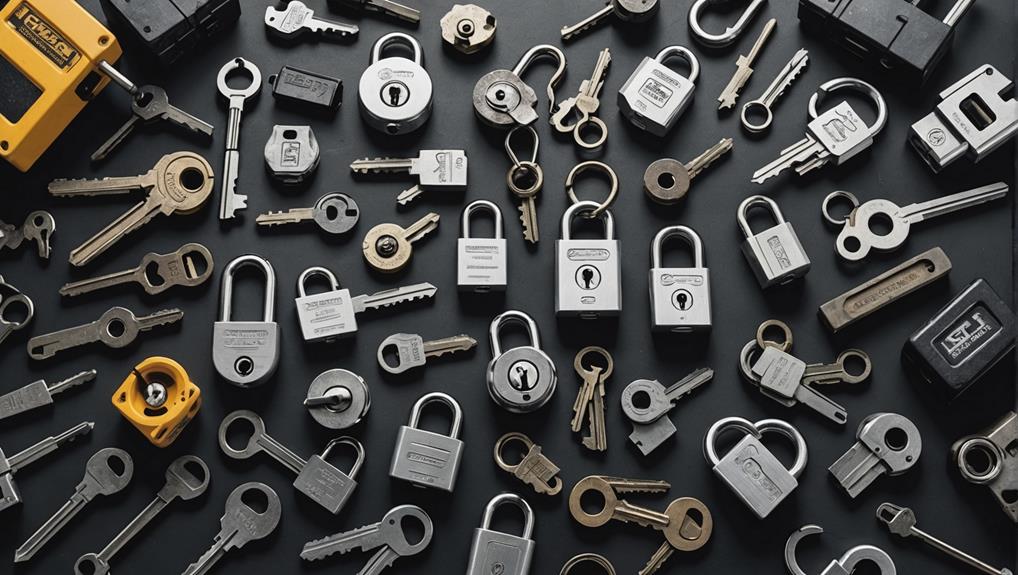
When it comes to high-security locks, the choice of reinforced materials greatly impacts their overall durability. Upgrading your locks is an essential step in enhancing security, as prioritizing security guarantees that you're making informed choices about your home's protection.
You want locks that can withstand various threats, from brute force to environmental wear. Selecting the right materials guarantees your locks serve their purpose effectively and protect what matters most.
Here are some reinforced materials to take into account:
- Steel: Known for its strength, steel offers excellent resistance to cutting and drilling.
- Brass: Durable and weather-resistant, brass can withstand corrosion while maintaining its appearance.
- Zinc Alloy: This lightweight material combines durability with resistance to rust, making it ideal for outdoor locks.
- Polycarbonate: Often used in keypads, polycarbonate is impact-resistant and can endure extreme temperatures.
- Ceramic Coatings: These coatings enhance the durability of metal surfaces, providing additional protection against scratches and wear.
Types of High-Security Locks
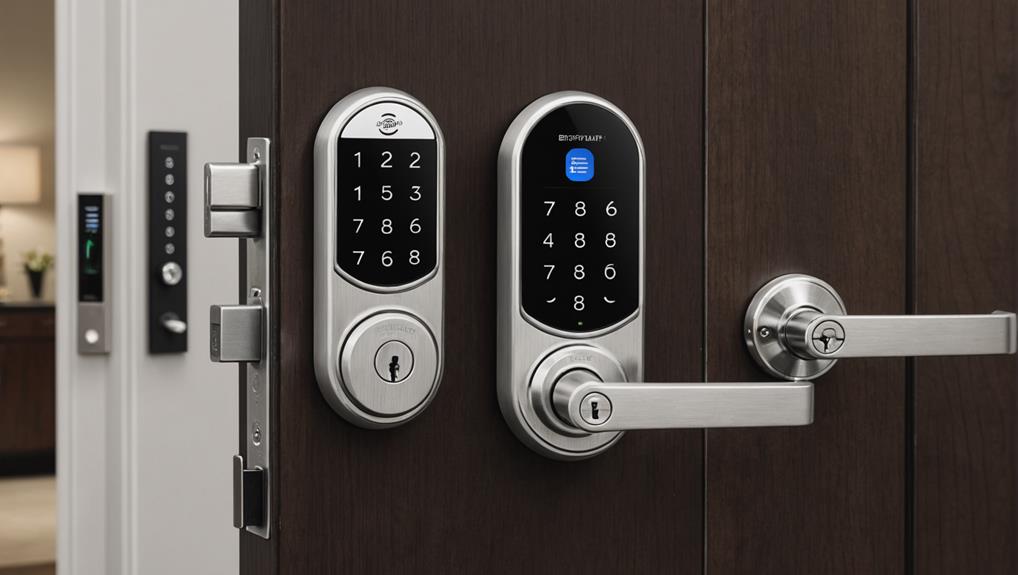
High-security locks come in various types, each designed to address specific security needs and vulnerabilities. Understanding these types can help you serve others effectively by ensuring they've the right protection.
For instance, it's important to assess your specific environment and the level of risk you face, as this will guide you in selecting the most suitable lock choosing the best lock.
One common type is the deadbolt lock, which provides an extra layer of security compared to standard locks. These are often used on exterior doors to prevent unauthorized entry.
Another option is the smart lock, which allows for keyless entry and remote access. This is especially useful for those who need to grant access to others without being physically present.
You might also consider padlocks, which come in different styles, such as combination or key-operated versions. These are versatile and can secure anything from lockers to gates.
High-security cylinder locks offer advanced features like anti-drill and anti-pick technology, making them a popular choice for businesses and residences alike.
Lastly, biometric locks use fingerprint or facial recognition technology, ensuring that only authorized individuals can gain access.
Benefits of High-Security Locks
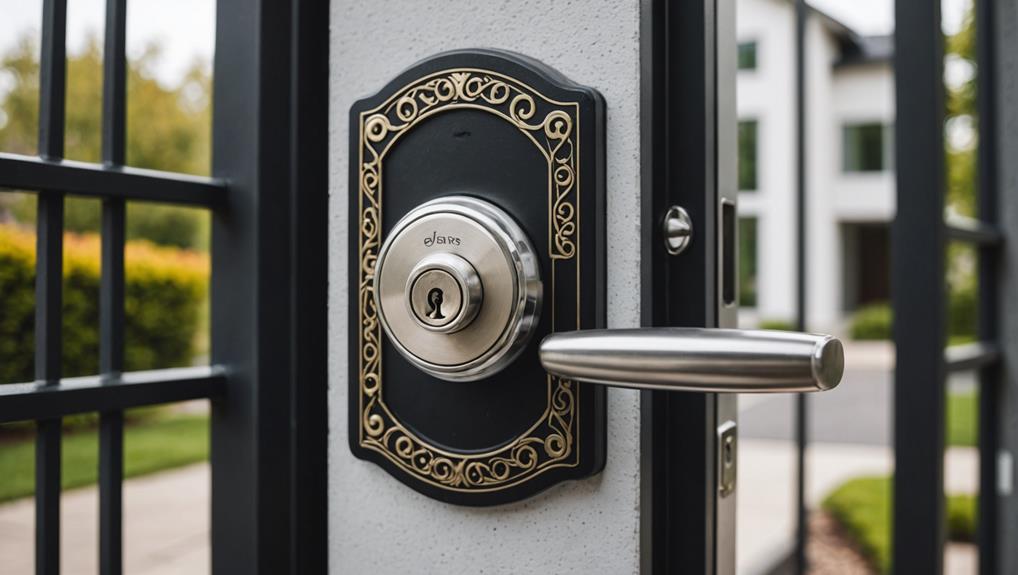
Choosing the right type of high-security lock not only addresses specific vulnerabilities but also brings several benefits that enhance overall security.
These locks are designed to deter unauthorized access, providing you with peace of mind knowing you're protecting what matters most. Additionally, it's crucial to verify that the locks you choose are insurance-compliant, as this can impact your coverage and premiums. Many insurance policies require specific standards for locks, so it's worth considering important tips for choosing insurance-compliant locks.
Here are some key benefits of high-security locks:
- Enhanced Resistance: They're built to withstand tampering, picking, and drilling, making them much harder for intruders to breach.
- Customized Solutions: You can often tailor these locks to fit your specific security needs, confirming your unique vulnerabilities are addressed.
- Durability: High-security locks are typically made from robust materials, providing long-lasting protection against wear and tear.
- Key Control: Many high-security systems come with restricted key duplication, so you can control who's access and prevent unauthorized copies.
- Insurance Benefits: Installing high-security locks may lower your insurance premiums, as they reduce the risk of burglary and loss.
Installation Considerations
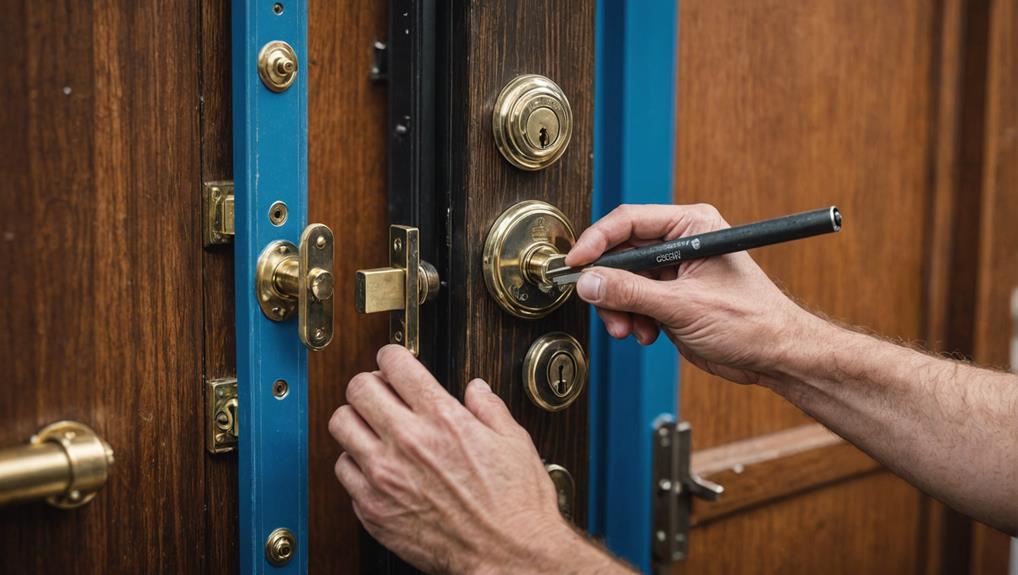
When it comes to installing high-security locks, you've got a choice between professional help and DIY.
While doing it yourself might seem tempting, the risks can outweigh the benefits if you lack the right skills.
Improper installation can't only compromise the lock's effectiveness but also void any warranties associated with the lock, leaving you unprotected.
Hiring a professional guarantees a secure installation, giving you peace of mind.
How improper installation affects warranties
Professional Installation Benefits
Investing in professional installation for high-security locks guarantees peak performance and peace of mind. By hiring an expert, you ascertain that your locks function as intended, providing maximum protection for your loved ones and belongings.
Here are some benefits of choosing professional installation:
- Expert Knowledge: Professionals understand the intricacies of high-security locks, ensuring they're installed correctly.
- Time Efficiency: You'll save time and avoid frustration, allowing you to focus on what truly matters—serving your community and family.
- Comprehensive Assessment: Experts assess your property's specific needs, recommending the best lock system for your situation.
- Warranty Protection: Many manufacturers require professional installation for warranty validity, giving you added peace of mind.
- Improved Security: Proper installation minimizes vulnerabilities, keeping your home or business more secure.
DIY Installation Risks
While professional installation offers numerous advantages, opting for DIY installation of high-security locks can introduce significant risks. You might think you're saving money or gaining control, but the consequences can be severe.
Incorrectly installed locks may compromise your security, leaving your home vulnerable to break-ins. If the lock isn't aligned properly or the mechanism isn't functioning as it should, it could fail when you need it most.
Moreover, many high-security locks come with specific installation requirements. Without the proper tools or expertise, you could damage the lock or your door. This could lead to costly repairs, negating any savings from a DIY approach.
Additionally, if the installation goes wrong, you may void the warranty, leaving you without recourse.
Maintenance and Care Tips
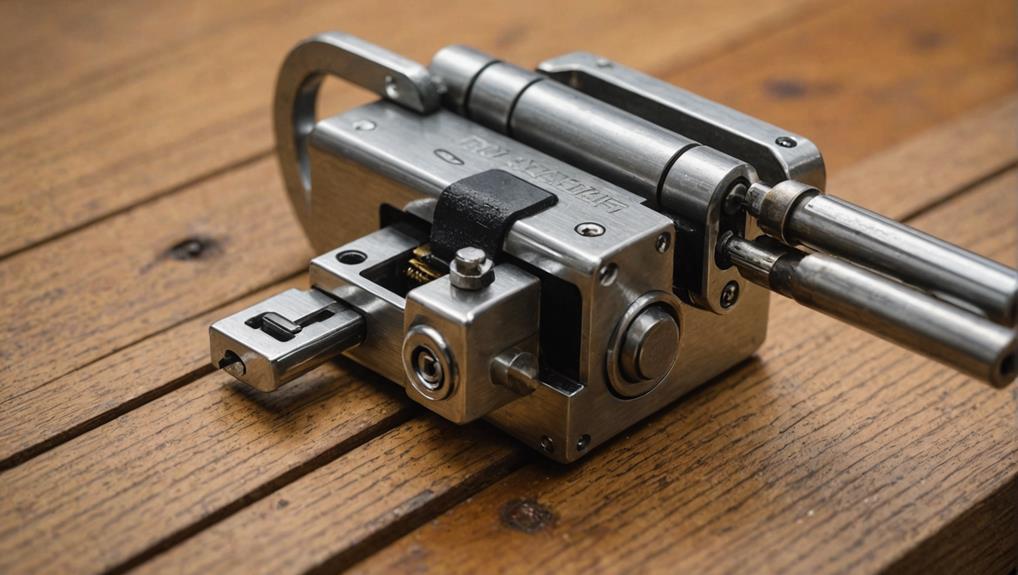
Maintaining high-security locks is essential for ensuring their effectiveness and longevity. Regular care not only preserves their functionality but also reinforces your commitment to security.
Lock re-keying can be an integral part of this maintenance, as it allows you to change the internal mechanism of your locks without replacing them entirely. This process can enhance your security by ensuring that lost or stolen keys no longer operate your locks, providing peace of mind understanding lock re-keying.
Here are some maintenance tips to keep your locks in top shape:
- Clean the key and lock regularly: Dirt and debris can accumulate, so wipe them down to prevent jamming.
- Lubricate the lock: Use a graphite-based lubricant annually to keep the moving parts functioning smoothly and avoid rust.
- Inspect for wear: Regularly check for any signs of damage or wear, such as misalignment or rust, and address issues promptly.
- Test the keys: Make sure your keys work smoothly in the locks. If they feel stiff or don't turn easily, it's time to clean or replace them.
- Secure your spare keys: Store spare keys in a safe place. If they're lost or compromised, it can jeopardize your lock's security.
Cost Comparison With Standard Locks
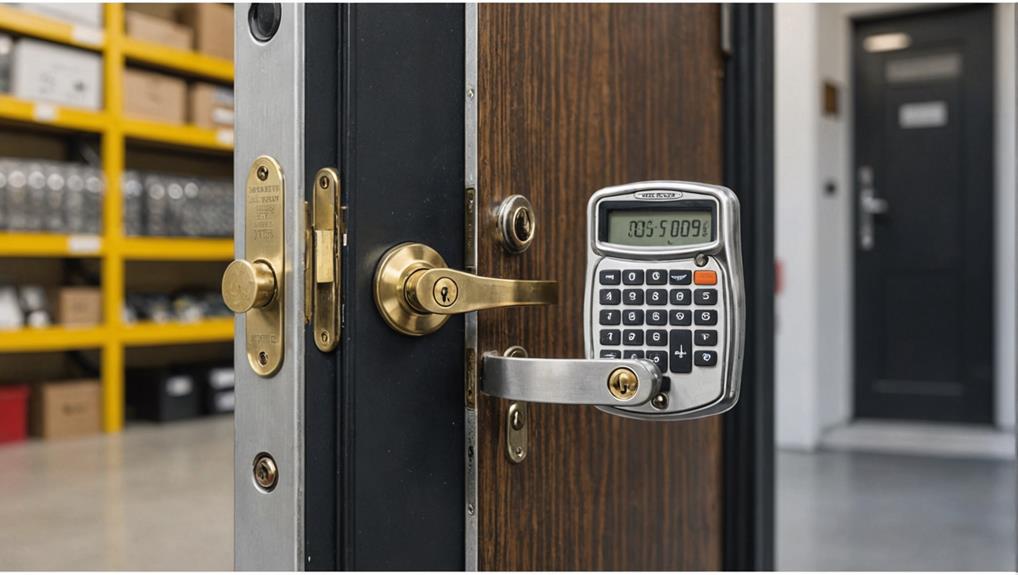
When considering high-security locks, it's crucial to look at their price range compared to standard locks.
While the initial cost of high-security locks can be higher, they often come with enhanced features that can reduce the likelihood of break-ins and increase security.
Additionally, exploring options like re-keying for savings can influence your decision. You might find that installation expenses can vary greatly, impacting your initial investment.
However, thinking about the long-term savings potential could change your perspective on the overall cost.
Price Range Overview
In the domain of security, high-security locks often come with a price tag that reflects their advanced features and enhanced protection.
While standard locks might cost you anywhere from $10 to $50, high-security locks typically range from $100 to $300 or more, depending on the brand and complexity.
Investing in these locks can be a wise decision if you're looking to serve others by ensuring their safety.
Here's a quick overview of what to expect regarding pricing:
- Basic High-Security Locks: $100 – $150
- Mid-Range Options: $150 – $250
- Top-Tier High-Security Locks: $250 – $500+
- Smart High-Security Locks: $150 – $300
- Rekeying Services: $20 – $50 per lock
Installation Expenses
Installing high-security locks typically incurs higher costs compared to standard locks, reflecting their advanced design and technology. When you consider the installation expenses, you're not just paying for the lock itself, but also for the expertise needed to properly install it.
High-security locks often require specialized tools and techniques, which can lead to additional labor costs. You should also factor in the complexity of your door or frame. If your current setup needs modifications to accommodate the new locks, that can further increase your expenses.
While standard locks might be easier and cheaper to install due to their simpler designs, investing in high-security options provides peace of mind that standard locks may not.
If you're looking to serve your community effectively, consider the long-term implications of your investment. The upfront costs may be higher, but the enhanced security features can protect not just your property, but also the safety of those around you.
Ultimately, choosing high-security locks means prioritizing safety and reliability, ensuring that you provide a secure environment for everyone who depends on you.
Long-Term Savings Potential
Investing in high-security locks can lead to significant long-term savings, often outweighing the initial higher costs associated with their installation.
While standard locks may seem budget-friendly upfront, their frequent replacements and vulnerabilities can add up over time. By opting for high-security locks, you not only enhance safety but also reduce future expenses.
Here are some factors that contribute to your long-term savings potential:
- Durability: High-security locks are built to withstand wear and tear, lasting much longer than standard locks.
- Fewer Replacements: The robust nature of high-security locks means you won't need to replace them as frequently.
- Insurance Discounts: Many insurance companies offer lower premiums for properties equipped with high-security locks, resulting in savings.
- Reduced Theft Risk: Investing in security can deter burglars, minimizing the financial losses associated with theft.
- Peace of Mind: Knowing your property is secure can reduce stress and the potential cost of security breaches.
In the end, choosing high-security locks is a smart financial decision that protects your investment and serves your community well.
Choosing the Right High-Security Lock
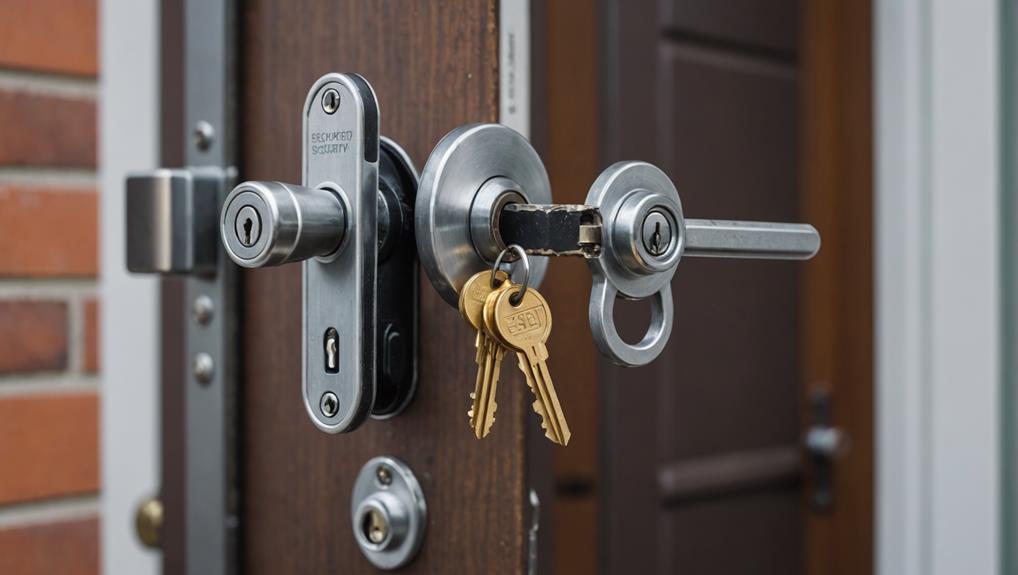
When it comes to securing your property, selecting the right high-security lock is essential for peace of mind.
Start by evaluating your specific needs. Consider the areas you want to protect—your home, office, or storage units. Each location may require different levels of security, especially for businesses where essential lock replacement can greatly enhance overall safety.
Next, look for locks that offer advanced features such as pick resistance, drill resistance, and key control. A lock with a restricted keyway can limit unauthorized duplication, ensuring only trusted individuals have access.
Don't forget to check for certifications from recognized security standards, which indicate reliability and effectiveness.
Also, think about the type of locking mechanism that suits your lifestyle. Electronic locks provide convenience and can be programmed to grant access to multiple users, which can be invaluable in community settings.
On the other hand, traditional mechanical locks may offer a robust, simpler solution.
Frequently Asked Questions
Can High-Security Locks Be Rekeyed or Do They Require Replacement?
Yes, high-security locks can often be rekeyed, depending on the specific design and manufacturer.
This means you don't always have to replace the entire lock if you want to change the key access.
Rekeying is a cost-effective solution that maintains your lock's integrity while enhancing security.
Just check with a professional locksmith to verify your lock is suitable for rekeying, and you'll save time and money while keeping your space secure.
Are High-Security Locks Resistant to Bumping and Picking Techniques?
Oh sure, let's just assume bumping and picking are as effective as a butter knife at a steakhouse!
In reality, high-security locks are designed to thwart those very techniques. They typically feature advanced mechanisms and materials that resist manipulation.
So, when you're safeguarding your treasures, rest easy knowing these locks offer significant protection.
After all, you're not just locking a door; you're fortifying a fortress for those you serve.
How Do I Know if a Lock Is Truly High-Security?
To know if a lock is truly high-security, look for certifications from recognized organizations like ANSI or UL.
Check for features like anti-drill plates, complex keyways, and unique key control systems.
You should also consider the brand's reputation and customer reviews.
If a lock offers multiple layers of protection and is made from durable materials, you can feel confident in its security.
Don't hesitate to consult with a locksmith for expert advice, either!
Can I Use a High-Security Lock for My Sliding Door?
Yes, you can use a high-security lock for your sliding door!
Just make certain the lock is specifically designed for sliding doors, as their mechanisms differ from standard locks.
Installing a high-security lock enhances your door's safety, providing peace of mind.
Look for options that resist tampering and have durable materials.
It's also wise to consult a locksmith to guarantee proper installation and compatibility with your door's structure.
What Certifications Should I Look for in High-Security Locks?
When it comes to choosing high-security locks, think of them as the knights guarding your castle.
You'll want to look for certifications like ANSI, UL, or BHMA, which guarantee they meet rigorous standards. These markers show the locks can withstand attacks and resist picking.
Remember, it's not just about protecting your space; it's about keeping your loved ones safe.
Invest in quality, and you're not just securing doors, you're providing peace of mind.
Conclusion
In a world brimming with potential threats, high-security locks stand as your impenetrable fortress—an unyielding shield against intruders. With their advanced features and superior materials, they don't just secure your space; they transform it into a bastion of safety. Investing in the right high-security lock isn't merely a choice; it's a declaration that you refuse to compromise on security. So go ahead, choose wisely, and let your peace of mind reign supreme while the world outside remains at bay!

